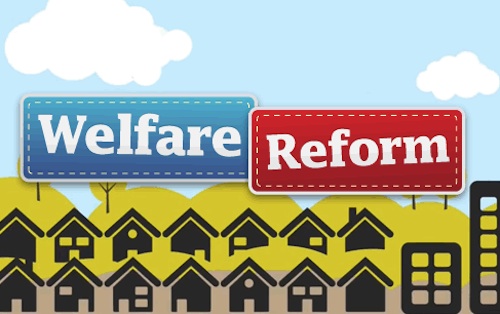Robert Moffitt is an economist at Johns Hopkins; most of his research is around the idea of taxes, health care, and welfare. Indeed, he has a huge study coming out in the academic journal Demography later this year/next year about the evolution of welfare in the United States. It’s fairly eye-opening.
Overall, if you adjust for inflation, the United States spent 74 percent more on welfare programs in 2007 than 1975, for example — but the problem is, those programs don’t actually reach the poorest/neediest Americans:
Here’s some more context, via Wonkblog:
That looks like a big expansion, right? But the programs that have made up the largest share of that growth aren’t geared toward the poorest Americans, those who earn little or no money at all. Supplemental Security Income is only available to the elderly, the blind and the disabled. The Earned Income Tax Credit only benefits families who earn enough to qualify for a tax credit (generally those families making from $10,000 to $20,000 a year benefit the most). Families that don’t make enough to owe taxes similarly don’t benefit from the Child Tax Credit.
The program that has historically done the most to directly help the poorest of the poor — regardless of disability, age or tax qualifications — was Aid to Families with Dependent Children. That program was heavily revised during the 1996 welfare reform law (when it became TANF). In the 10 years after that law was passed, with new work requirements, the number of poor families headed by a single mother who were helped by the program dropped by 63 percent.
This stuff is extremely interesting and relevant because it literally ties back to the very fabric of a society: what do we do with those who are less well-off, and how do we construe who they are? Do we even think there’s a responsibility to them, or do we view America as a “bootstraps” nation where anyone can make it with a little elbow grease? And if that’s increasingly not true, then what does the future hold?
This research by Moffitt, in his own arguments, shows that the distinction has become sharper — in the political and cultural discourse — between who is “deserving” of federal assistance and who isn’t. If you’re working, married, and have children … you’re deserving, broadly-speaking. If you’re a single parent, a childless adult, or just someone out of work … you’re undeserving. Here’s the dagger line he told Wonkblog:
“Single mothers seem to be especially viewed as undeserving,” Moffitt says, “as though that’s a choice somehow.”
The headline on that article is one of his other quotes — “If you’re trying and not succeeding, the welfare system basically gives you nothing.” That’s the modern reality, and it’s also the antithesis of why welfare systems were put in place to begin with (i.e. you’re supposed to be helping those who have tried but haven’t found success, which is a sizable chunk of the population, and probably one that’s growing with a still-somewhat-stalled economy).
Salon’s second-deck on this article talks about “choosing to inflict misery while protecting the rich.” I don’t know if I’d say it’s that drastic, but it seems to be trending in that direction as opposed to trying to equal the playing field. Cue the discussion: is the United States really an oligarchy? Whatever your political viewpoint is, you need to admit that as the playing field becomes harder to equalize, we need new discussions in this space. What would you do?


Yeah, Nothing about this surprises me and it just makes credible economists like Paul Krugman look bad. http://wp.me/p4oODX-15
Sorry having to say this, but in the xxi century, barred rape (and even then, the USA are among the most liberal countries about abortion), being a single mother is indeed a choice.
Single mothers are overwhelmingly never married, not divorced and yes, having kids out of wedlock is a choice.